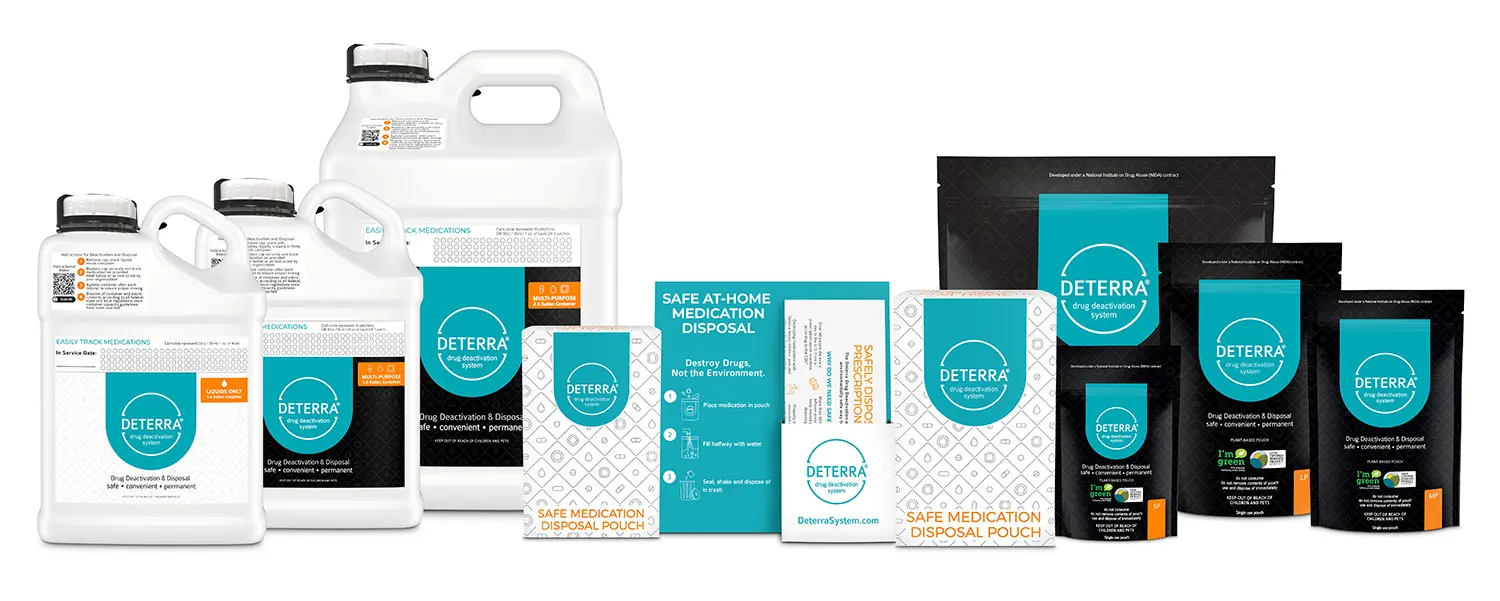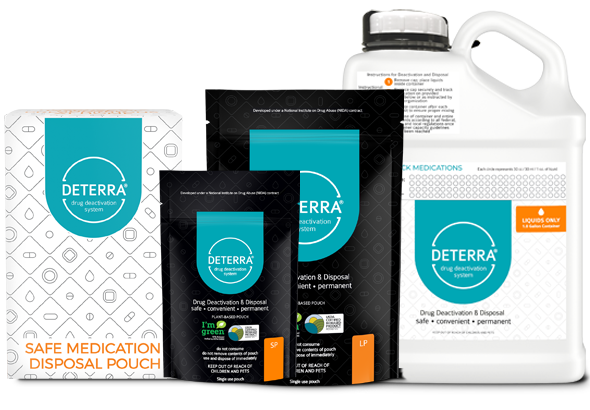what is medication misuse costing you?
A Household Mailing Campaign with the NEW Deterra Direct Mail Pouch can help reduce the costs of drug misuse and save lives. Get a free custom assessment to see the ROI of a Deterra Household Mailing Campaign.
A direct-to-household mailing of Deterra Drug Deactivation and Disposal Pouches can help reduce the costs associated with drug misuse. Get…
The Hennepin County Sheriff’s Office combats local overdose spike by mailing Deterra drug disposal bags to residents to safely destroy…

The patented Deterra System deactivates prescription drugs, pills, patches, liquids, creams and films. Deterra renders them inert, unavailable for misuse and safe for the environment. In a simple 3-step process, a user deactivates the drugs by putting them in a Deterra pouch or container, adding water, sealing, shaking and throwing it away. It’s truly that simple.
A Household Mailing Campaign with the NEW Deterra Direct Mail Pouch is a cost-effective way to promote prevention.
Learn how providers like Dr. Colbath, Twin Cities Orthopedics and Inspira Health use Deterra to make a difference for patients.
Help educate your customers on the importance of proper drug disposal with our free promotional materials.
Our products are now available to order case quantities online. Create a business account to see case quantity pricing for Deterra Pouches, containers and more.

The Deterra Drug Deactivation System is the only answer for safe, permanent medication disposal and is trusted by numerous organizations dedicated to safe at-home and on-site disposal for unused medications.
A Household Mailing Campaign with the NEW Deterra Direct Mail Pouch can help reduce the costs of drug misuse and save lives. Get a free custom assessment to see the ROI of a Deterra Household Mailing Campaign.
Sign up to be notified of exclusive offers & the latest news on safe at-home drug disposal.
Learn more about how Deterra Drug Deactivation and Disposal System Pouches, Containers and Kits can meet the safe drug disposal needs of healthcare providers, pharmacies and health plans & pharmacy benefits managers.



The Deterra Drug Deactivation System is the simplest and most effective way to dispose of medication at home or in a clinical setting to keep unwanted prescription and over the counter drugs out of the wrong hands and prevent environmental contamination. Below, you’ll find answers to some of the most frequently asked questions we receive about Deterra products and at-home drug disposal.
Deterra is the only at-home drug disposal system that is scientifically proven to permanently deactivate and destroy drugs, rendering them unavailable for abuse and misuse.
1 Compared to Deterra products, competitor products contain a higher percentage of plastic when disposed of: DisposeRx® 59%; NarcX® 78%; Rx Destroyer™ 68%; Drug Buster® 67%
Each patented Deterra Pouch contains a water-soluble inner pod containing proprietary activated carbon. To dispose of prescription or over the counter medications, a user places the drugs in the pouch and adds water, which dissolves the inner pod and releases the activated carbon. The carbon binds to the active ingredients in the medications. Once deactivated, the drugs are permanently and irreversibly destroyed, unavailable for misuse and safe for disposal in the normal trash.
To learn more about the science behind Deterra, visit our Science and Research section. For how-to videos and instructions for how to use the Deterra Drug Deactivation System to dispose of medications, visit our Resources section.
The Deterra® Drug Deactivation and Disposal System will deactivate organic medications including opioids, fentanyl, most illicit drugs and vape fluid.
However, Deterra will not adsorb biologics, such as vaccines and immunotherapeutics which are typically administered in a healthcare setting. Additionally, inorganic medications—such as antacids, lithium, and iron supplements—will not be adsorbed. Deterra will not deactivate leaf marijuana.
It is impossible to know all forms and potency of illicit drugs. Follow state and local guidelines on safe medication disposal where applicable.
If your medication has specific disposal instructions, please follow the directions as given. Consult authorities or your pharmacist for more specific questions.
Yes, Deterra is available in multiple sizes. If you’re interested in Deterra for yourself, you can view sizes and purchase online here. For case quantities, visit our business products page or contact a Deterra representative at (612) 568-1128 to determine which size will best meet your needs.
The recommended capacity varies by size and is listed on each Deterra pouch or container. Please always follow the directions on the back of the Deterra Drug Deactivation System.
On a per-pill basis, Deterra is the least costly at-home, permanent deactivation option. Volume discounts are available on quantities of 100,000 or more. Contact us at (612) 568-1128 for a custom quote or get pricing online.
Deterra is officially endorsed by the DEA Educational Foundation and Community Anti-Drug Coalitions of America (CADCA) for unused drug deactivation and disposal.
Deterra is the only product that CADCA has endorsed in its 30-year history. Both CADCA and the DEA Educational Foundation cite Deterra’s strong scientific backing and proven effectiveness as reasons why Deterra products are trusted over other products on the market.
Updated FDA guidelines for drug disposal include at-home medication disposal products as a safe, convenient way to properly dispose of unused medicine.
At-home drug disposal is generally unregulated by federal, state and local authorities. Local regulations may vary, please consult authorities or your pharmacist with specific questions. Deterra is not for use with drugs that are supplied with specific disposal instructions. Different laws may apply to healthcare or other regulated facilities.
Deterra is environmentally sound through the entire product life cycle. From using 100% wind-generated power in production of the plant-based pouches to the non-toxic organic ingredients to its innovative pouch design, the product:
To help educate users on the importance of proper drug disposal for the environment and how to use the Deterra® Drug Deactivation System, we offer free educational materials for consumers and dispensers. See resources.
According to the DEA, any destruction method applied to a controlled substance must render it “non-retrievable” and subsequently unavailable, unusable, and no longer available for diversion for all practical purposes. Testing results have shown Deterra renders drugs non-retrievable for all practical purposes. Ultimately, it is up to the individual waste generator to ensure that they comply with all local, state and federal regulations.
Generally, most medications should not be flushed. Water treatment facilities struggle to filter out all pharmaceutical drugs from the water. As of 2014, there were over 1,500 published reports of the occurrence of pharmaceuticals in sewage, surface waters, ground waters, and elsewhere. One study found 47 different pharmaceutical drugs in source water samples and 37 different drugs in water after moving through water treatment plants across the U.S. Because of these findings, most federal, state and local authorities are now recommending (and many requiring) that pharmaceuticals NOT be disposed of in the toilet or sink.
These common but ineffective methods of medication disposal harm the environment and maintain the integrity of the active drugs. Medications are not completely destroyed if you use these temporary methods – abuse can still occur. Cat litter, coffee grounds, and sawdust may make the drug undesirable but do not deactivate the drugs. Once in the landfill, these drugs may potentially leach into the ground and into the water. Third-party testing proves that the proprietary activated carbon in Deterra deactivates the drugs rendering them inert and safe for the environment.